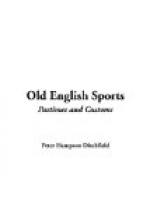Before the Reformation there was another very strange custom associated with this day; namely, the election of a boy bishop, who was dressed in episcopal robes, with a mitre on his head, and who actually was allowed to preach in the church. This was done regularly at many of our cathedrals and collegiate churches, and we find records of the custom amongst the archives of Salisbury and many other places; even the service which they used is in existence. The youthful bishop was elected by the choir-boys, and exercised his functions until Holy Innocents’ Day. On that day in great state he entered the cathedral surrounded by the other boys, who played the part of prebendaries, and attended by the dean and canons, who on this occasion yielded up their dignity to the youthful prelate and his followers. The collect for Holy Innocents’ Day in our Prayer-book formed part of the service. It was a strange ceremony, not unmixed with irreverence, and happily has long been discontinued, being forbidden by Royal proclamation in 1542, and finally abolished by Elizabeth.
In the archives of the ancient town of Bristol there is a book of directions for the Mayor and his brethren, and on St. Nicholas’ Day they are ordered to go to the Church of St. Nicholas and join in the festival of the boy bishop, to hear his sermon and receive his blessing. Then they dined together, and waited for the young bishop to come to them, playing the meanwhile at dice, the town clerk being ordered to find the dice, and to receive a penny for every raffle. The bishop was regaled with bread and wine, and preached again to the Mayor and corporation in the evening. I am informed that a curious memorial of this custom existed until recent years in one village at least. An old lady recollected that when she was a child she was allowed to play with her companions in church on St. Nicholas’ Day.
But Christmas is approaching, and we must hasten to describe that bright and happy festival. The holiday began on Christmas Eve, and perhaps you have wondered why we hang up mistletoe, and decorate our churches and houses with holly, why our ancestors brought in the Yule-log, and performed many other customs which do not seem to be very closely connected with the celebration of the birthday of our Lord. But we must remember that our forefathers were originally heathen, and at this period of the year they practised several strange customs connected with their Druidical worship, and held great feasts in honour of their gods. When Christian missionaries converted these heathen, they strove to put down some of the old idolatrous practices; but their efforts were in vain, for the people were warmly attached to these old rights and usages. So a compromise was effected: the old Pagan customs were shorn of their idolatry and transferred to our Christian festivals. Cutting the mistletoe was distinctly a rite practised by the Druids, who cut the sacred plant with a golden knife,




